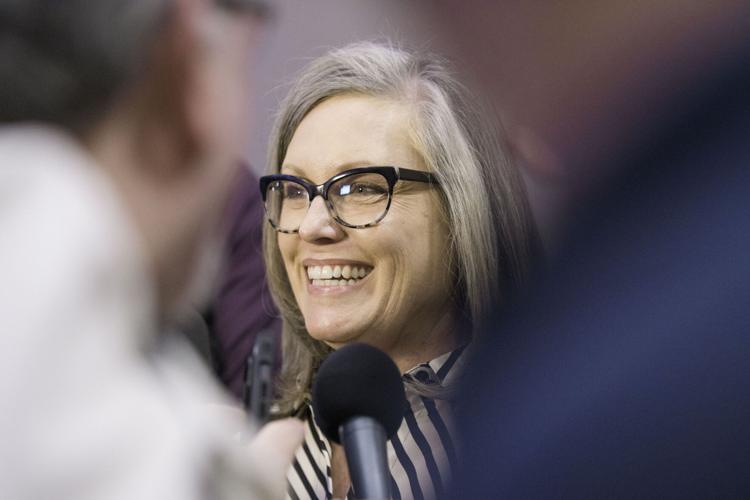PHOENIX — Arizona’s Democratic governor has stopped the Republican-led Legislature from banning what has been called “critical race theory’’ in public schools.
Gov. Katie Hobbs vetoed legislation Thursday that its prime sponsor, Chandler Republican Sen. J.D. Mesnard, says would preclude schools from “pushing a destructive and racist ideology,’’ in his words. He contends some students are being taught that America as a whole is as racist country.
But Hobbs, in her 16th veto since the legislative session began in January, said this is a fake political issue.
“It is time to stop utilizing students and teachers in culture wars based on fearmongering and unfounded accusations,’’ she wrote. “Bills like SB 1305 only serve to divide and antagonize.’’
“I just fundamentally disagree that this bill addresses a real problem that we’re facing in our schools,’’ Hobbs said during a briefing Thursday with reporters.
Hobbs made it clear that if lawmakers send her similar measures dealing with what she says are fake education issues, they will meet a similar fate.
“I urge the Legislature to work with me on the real issues affecting Arizona schools: underfunded classrooms, a growing educator retention crisis, and school buildings in need of repair and replacement,’’ she said.
Mesnard countered: “I don’t think it’s a made-up issue. He said parents are “very concerned with some of the assignments their kids are coming home with.’’
He also said it’s not like approving a bill on banning the teaching of critical race theory takes away focus from other issues. “We can multi-task,’’ he said.
Strictly speaking, the vetoed SB1305 does not contain the words “critical race theory’’ despite the fact that is how Mesnard and many Republicans refer to it.
Instead, it contains a list of concepts that he, and other Republicans in the House and Senate, said should not be taught in public schools.
These included:
Judging an individual on the basis of the individual’s race or ethnicity;
Teaching that one race or ethnic group is inherently morally or intellectually superior to another;
Discussing that an individual, by virtue of race or ethnicity, is inherently racist or oppressive, whether consciously or otherwise;
Saying any individual bears responsibility or blame for actions committed by those of the same race or ethnic group.
The measure said teachers found to run afoul of the provisions would be subject to discipline “as the State Board of Education deems appropriate.’’ School districts would have been subject to $5,000-a-day fines.
Critics said that could result in teachers avoiding controversial subjects and refusing to answer questions from students on issues of race and ethnicity.
Hobbs, in response to a question Thursday, said that if students are getting lessons and exercises that divide them up into groups to understand certain experiences, such as being privileged or not, for example, she is sure there is a good reason.
“They’re using curriculum to teach a lesson,’’ Hobbs said. “I’m not going to question what they’re doing. I’m sorry that parents were offended by that,” she said of the example posed to her, which some parents had testified about.
Mesnard maintained his bill wouldn’t have chilled valid lessons. He said SB1305 specifically listed slavery, the removal of Native Americans from their lands, the Holocaust and the internment of Japanese-Americans during World War II as permissible subjects.
But he said the legislation never said that was “a full, encompassing list’’ of what could be taught. It would have allowed teachers and invited guests to discuss “historical movements, ideologies or instances of racial hatred or discrimination,” he said.
But Mesnard said some things are “abhorrent and shouldn’t be taught,’’ such as telling kids they are responsible for acts done by those of their own race. That made the legislation necessary, he said.
“This is an issue that, if you don’t nip it in the bud now, you are going to see more and more,’’ Mesnard said. He said he “wanted to stop it before it becomes a bigger problem.’’
He also brushed aside concerns teachers would steer clear of controversial subjects out of fear of being disciplined. Mesnard said his own experiences as a political science teacher at Mesa Community College and Arizona State University convince him there are ways to teach about the history of racism without running afoul of the provisions of SB1305 and the specific list of what the measure would have prohibited.
Even in the case of a complaint that a lesson went over the line, a “multi-layered’’ procedure would have to be completed, Mesnard said.
“The idea that someone’s going to be punished for an incidental, accidental, ‘I didn’t realize that would fall into this category’ (infraction) is impossible,’’ he said.
Get your morning recap of today's local news and read the full stories here: tucne.ws/morning





